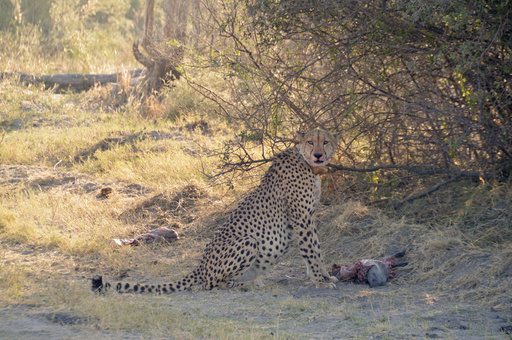Cheetahs become more nocturnal on hot days–study

In this photo provided by Briana Abrahms, a male cheetah, named Qamar, has a fully belly after making a kill in northern Botswana on July 17, 2015. He wears a GPS collar as part of a study. Cheetahs are usually daytime hunters, but the speedy big cats will shift their activity toward dawn and dusk hours during warmer weather, according to a study published Wednesday, Nov. 8, 2023, in the journal Proceedings of the Royal Society B. Unfortunately for endangered cheetahs, that sets them up for more potential conflicts with mostly nocturnal competing predators like lions and leopards, say the authors of the paper. (Briana Abrahms via AP)
Cheetahs are usually daytime hunters, but the speedy big cats will shift their activity toward dawn and dusk hours during warmer weather, a new study finds.
Unfortunately for endangered cheetahs, that sets them up for more potential conflicts with mostly nocturnal competing predators such as lions and leopards, say the authors of research published Wednesday in the journal Proceedings of the Royal Society B.
“Changing temperatures can impact the behavior patterns of large carnivore species and also the dynamics among species,” said University of Washington biologist Briana Abrahms, a study co-author.
While cheetahs only eat fresh meat, lions and leopards will sometimes opportunistically scavenge from smaller predators.
“Lions and leopards normally kill prey themselves, but if they come across a cheetah’s kill, they will try to take it,” said Bettina Wachter, a behavioral biologist who leads the Cheetah Research Project at the Leibniz Institute for Zoo and Wildlife Research.
“The cheetahs will not fight the larger cats, they will just leave,” said Wachter, who is based in Namibia and was not involved in the study.
Hunting at different times of the day is one long-evolved strategy to reduce encounters between the multiple predator species that share northern Botswana’s mixed savannah and forest landscape.
But the new study found that on the hottest days, when maximum daily temperatures soared to nearly 45 degrees Celsius (113 degrees Fahrenheit), cheetahs became more nocturnal — increasing their overlapping hunting hours with rival big cats by 16%.
“There’s a greater chance for more unfriendly encounters and less food for the cheetahs,” said co-author Kasim Rafiq, a biologist at the University of Washington and the nonprofit Botswana Predator Conservation Trust.
For the current study, researchers placed GPS tracking collars on 53 large carnivores — including cheetahs, lions, leopards and African wild dogs — and recorded their locations and hours of activity over eight years. They compared this data with maximum daily temperature records.
While seasonal cycles explain most temperature fluctuations in the study window of 2011 to 2018, the scientists say the observed behavior changes offer a peek into the future of a warming world.
In the next phase of research, the scientists plan to use audio-recording devices and accelerometers — “like a Fitbit for big cats,” said Rafiq — to document the frequency of encounters between large carnivores.
In addition to competition with lions and leopards, cheetahs already face severe pressure from habitat fragmentation and conflict with humans.
The fastest land animal, cheetahs are the rarest big cat in Africa, with fewer than 7,000 left in the wild.
“These climate changes could become really critical if we look into the future — it’s predicted to become much warmer in this part of Africa where cheetahs live, in Botswana, Namibia and Zambia,” said Wachter of the Cheetah Research Project.